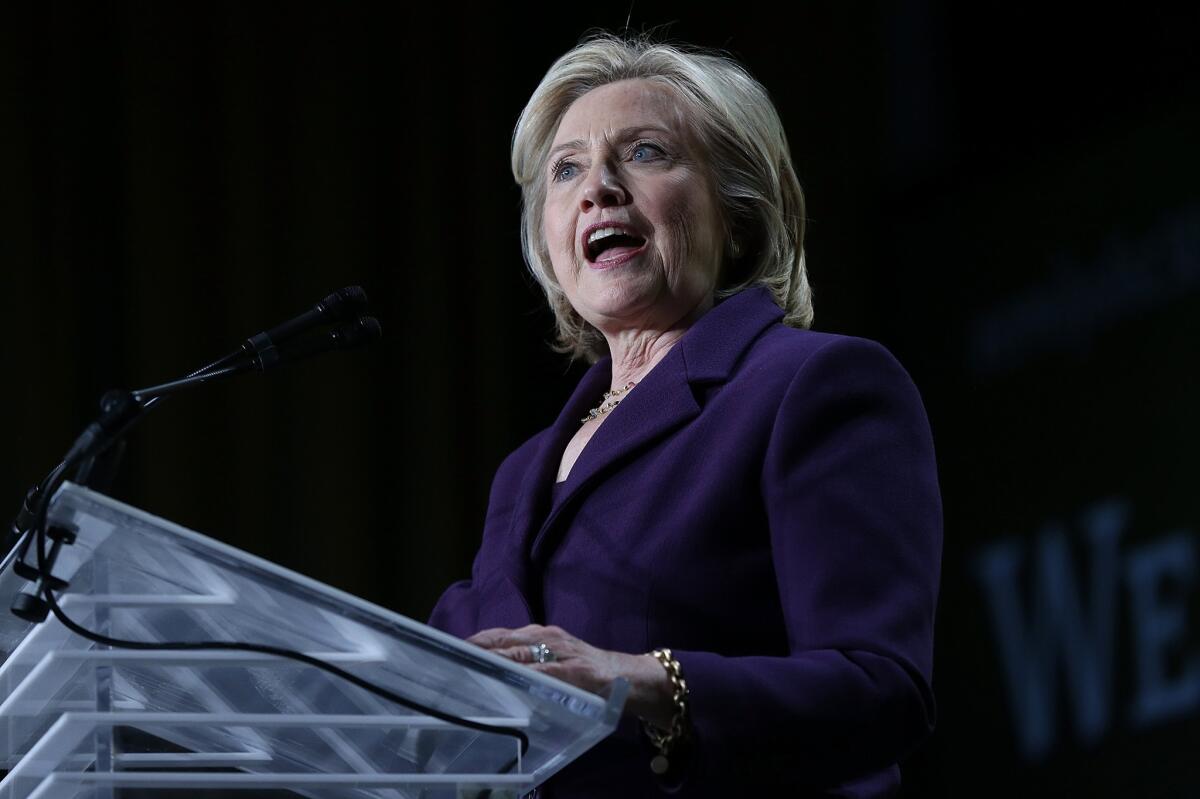Lawmakers subpoena Hillary Clintonâs private emails on Benghazi attack

Reporting from Washington â Lawmakers began investigating Hillary Rodham Clintonâs use of personal email while she was secretary of State after the disclosure Wednesday that she had exclusive control over her email account through a private server linked to her New York home.
The House Select Committee on Benghazi, which has been investigating the fatal 2012 attack on a U.S. diplomatic compound in Libya, said it issued subpoenas for Clintonâs personal emails related to the attack, and for those of others who also might have information. The panel sent letters to Internet firms telling them to preserve emails.
Meanwhile, Internet records confirmed Clinton had her own server installed to use the clintonemail.com account, which was set up in January 2009, when she began serving as top U.S. diplomat. Use of the server was first reported by the Associated Press.
While her private email use appeared to break no law, it violated administration policy calling for officials to use government email accounts. Legal experts and public-disclosure advocates contend her use of the account could limit public access to her records.
Critics say it raises questions about Clintonâs penchant for secrecy during her public career, and could complicate her expected run for the presidency.
Clinton turned over some of her messages at the State Departmentâs request last year. Late Wednesday, she said on Twitter: âI want the public to see my email. I asked State to release them. They said they will review them for release as soon as possible.â
The Benghazi committee has been pressing Clinton for more details of how she and other State Department officials responded to the attack. The new revelations could extend the committeeâs investigation and escalate its conflict with Clinton.
A spokesman for the committee, Jamal D. Ware, said the panel had discovered Clinton used two separate email addresses while she was secretary of State.
âWithout access to the relevant electronic information and stored data on the server â which was reportedly registered to her home â there is no way the committee, or anyone else, can fully explain why the committee uncovered two email addresses,â the statement said.
Rep. Trey Gowdy (R-S.C.), chairman of the committee, told reporters the panel would âuse whatever legal recourse we have to get the documents.â
Rep. Elijah E. Cummings (D-Md.), the top Democrat on the panel, said recent disclosures had confirmed Democratic suspicions that the special committee was formed to be a launching ground for attacks on the partyâs potential presidential nominee.
âI did not want to believe it,â he told reporters. âBut everything Iâve seen so far has led me to believe that this is an effort to go after Hillary Clinton, period. Thatâs very, very unfortunate.â
Internet records show that the digital address for Clintonâs server was registered at Clintonâs home address under someone elseâs name. Itâs not clear whether the server was physically located at her home.
Clintonâs staff hasnât explained why she decided to use personal email. Often, those who use servers for such a purpose are concerned about privacy and security and donât want to rely on a large Internet company. Servers, which can be located just about anywhere, typically store a copy of messages before sending them to a userâs email application on their smartphones or computers.
Security experts said Clinton essentially traded one form of protection for another by shielding her messages from open-records laws but giving up the industrial-level security of an employer that manages countless other email accounts, said Cameron Brown, vice president of engineering at Sendio Inc., a Newport Beach-based firm that develops email security and screening tools.
For example, Internet records show at least one technical flaw in the setup where someone could pretend to send email from a clintonemail.com address without actually having access to that account, said Patrick Peterson, chief executive of email security company Agari.
âThatâs a damning piece of evidence that shows me whoever set this up is probably not up to snuff,â Peterson said. âWe pay taxes to guarantee entire staffs monitoring this stuff, and here they are running off and doing it on their own.â
Such a system could prove vulnerable, he noted.
âThe real irony,â Peterson said, âis she might have made it harder for us as a populace and citizens to legally discover her email contents, but this potentially increases the chances that China and Russia can get in.â
Times staff writer Paresh Dave in Los Angeles contributed to this report.
More to Read
Sign up for Essential California
The most important California stories and recommendations in your inbox every morning.
You may occasionally receive promotional content from the Los Angeles Times.











